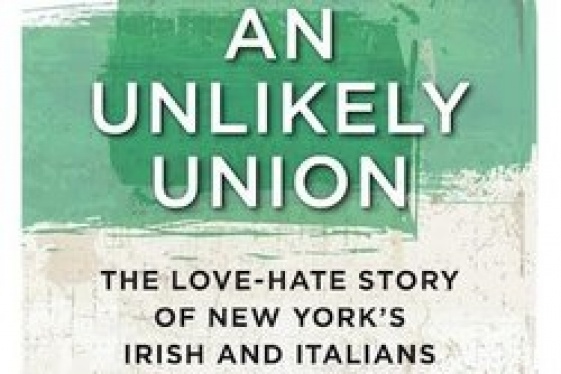
Davide Ippolito (Co-founder of the Italian American Reputation Lab)
Misuriamo la reputazione degli italoamericani: benvenuti allo IARL

This interview is a little different from the others, because it concerns a project that was born from the collaboration between We the Italians and Zwan, a leading Reputation Assessment company in Italy. With Davide Ippolito, the protagonist of this interview, we decided to start the Italian American Reputation Lab, which will monitor the reputation of Italian Americans through constant activities and an annual report.
The 2022 report was recently presented during the NIAF Gala day in Washington DC and then in New York at the Columbus Citizens Foundation, finding on both occasions a great success with the public and great interest also from the institutions, first of all the Italian Ambassador to America Her Excellency Mariangela Zappia to whom I personally had the opportunity to describe it.
Davide, why is reputation important?
Let's start from a premise: it is definitely more correct to speak of Reputations, in the plural, because more dimensions combine to form it. The aspect that is essential to understand, however, is this: even if there is no objective and unique value of the reputation, the many elements that make up the reputational capital have a direct impact on the economic capital of the organizations and it is precisely in this, to respond to your question, which lies its importance.
Linking reputation and economy closely is nothing new: just think of the insurance system or bank scores which, precisely on the basis of our reputation as payers, allow us to have a higher or lower mortgage. But, especially since Finance decided to focus on the intangible assets of reputation, going beyond profit and evaluating the environmental, social and human capital impact of organizations, this has become the real capital of the third millennium.
A few months ago your method for quantifying a reputation value has been publicly patented by the Italian government. Tell us more about how it
A few years ago, when we decided to deal with reputation for the first time, we immediately noticed how all those who were interested in it were able to measure it only partially: there were those who looked only to the economic or accounting side, focusing on reputational indices on which the scoring systems are based, others analyzed exclusively the so-called Web Reputation, and so on. Our idea was to start from its multidimensionality and to take into consideration its 10 dimensions: 5 drivers, that is the vehicles through which the reputational judgment of an organization is formed - products and services, leadership & innovation, CSR, workplace & governance, performance - and 5 relevant stakeholders from a reputational point of view, namely consumers and customers, investors and financiers, employees and colleagues, companies and institutions, suppliers. For the purposes of our measurements, no subjective or merit judgments impact these dimensions, but only and exclusively recognized certifications. Our algorithm therefore aims to weigh those certificates that have an impact on reputational dimensions, to give an objective and different evaluation to the work of organizations or, as has sometimes happened, even of nations or communities.
I leave it to you to tell our readers how the idea of setting up the Italian American Reputation Lab came to mind to us
When we met for my vlog, InsiderZ, you talked to me about the issue related to the figure of Columbus in America, a controversy that I knew very little about. However, I immediately realized how, behind those discussions, there was a strong reputational theme, not so much linked to the historical figure, but rather to that Italian-American community that you, with We The Italians, have successfully touched for many years. It was then at the We The Italians Gala Dinner that our common idea took shape and was structured around this reasoning: the Italian American community has experienced a long and tortuous perceptual evolution in the United States. On the one hand, the reputational risks fueled by simplifications, stereotypes, criminal activities, prejudices crystallized by cinema successes; on the other, the precious work of the associations to overcome them. And now the community's reputation is still undermined to some extent by the attacks on Columbus. It is therefore necessary to monitor the reputation of Italian Americans both in the States and in Italy, from where it is hoped that support will arrive at the institutional level.
Who are the subjects to whom IARL addresses?
The Italian American Reputation Lab is aimed primarily at institutional and para-institutional subjects in search of indications, perhaps even in the market, on the reputation of the Italian American community and also of Italy in the United States, taking into account the complexity of the United States, with aggregate data or state by state, Web Reputation analysis, qualitative and quantitative surveys, etc. This generates a wealth of useful information also for the Italian regions and at the same time for associations such as NIAF that interface with them. Think, for example, of the Region of Honor 2022 which is Tuscany and which may have an interest in knowing what degree of popularity it enjoys in the various federal states. Perhaps in some states it is known and appreciated for a reason, in others it is not known at all, in others it is known for elements that are not really identifying and, thanks to IARL data, it is possible to structure a communication that meets the different needs.
We launched IARL and the 2022 Report at the NIAF Gala event in Washington and then at the Columbus Foundation in New York. The success achieved leads us to confirm that it will be an annual report ...
Absolutely yes, the starting point was that first report presented at the NIAF Gala, thanks also to President Robert Allegrini who evidently understood its potential, and then to the Columbus Foundation in New York. It is now a question of continuing to monitor the reputational trends of Italian Americans over the years, also analyzing their community initiatives and how they will be perceived. The goal is to have a Permanent Observatory on the Reputation of Italian Americans, thus being able to rely on increasingly detailed data and long-term monitoring of trends, which always allows for rationalization and looking at the events affecting reputation with the right perspective. For example, from the 2022 Report, it emerges that the controversies over Columbus, while making a lot of noise, have actually involved a very small niche as a percentage of the American public. All initiatives on that issue must then be monitored over time, so that they can bring effective benefits to the Italian American community.
A few questions about the contents of the 2022 Report: tell us about Italy's reputation in the US
Italy in the United States is perceived as fashion, design, beauty and this is a macroscopic fact that is also confirmed by our measurements and our multidimensional approach. The 2022 Report still does not give us an image of the evolution over time of the reputation of Italian citizens of the Old Continent in the States. It will then be very interesting, with the Permanent Observatory, to analyze how any news events involving the US and Italy together can influence the perception of Italians and Italy among Italian Americans and other US citizens at a given moment.
What do the data contained in the report on the reputation of Italian Americans in America say?
First of all, let's start with a positive and valuable fact that emerges from the Report. Over the past 30 years, the Reputation of Italian Americans has grown by 38.3%. The confirmation comes from several fronts: if we go, for example, to look at the related keywords on search engines to the Italian American community, compared to negative issues that previously aroused more interest such as the "mafia", today the search volumes have much more important intentions linked to the world of food (Italian sauce, Italian cooking, pizza), of work, with Italians increasingly considered “hard workers”, of the family. It is the evident recognition of a culture well rooted in the country at every level. There is also great interest - and it was reasonable to expect - for universally acclaimed celebrities, whose Italian-American heritage is highlighted, as in the emblematic cases of Lady Gaga and the Russo brothers.
And what data emerge on the reputation of Italian Americans in Italy?
The Italian Americans are experiencing a successful reputational season in Italy, mainly due to the investments that some Italian American businessmen have made at the highest levels of Italian football. The most striking case is that of Rocco Commisso, president of Fiorentina, but he is not the only one. The Italian-American capital returning to Italy, therefore, greatly increase the positive perception of a community that was seen as distant, elusive, almost smoky. Positive sentiment exceeded 32%, compared with a negative one below 7 percentage points. Even Columbus Day, an anniversary not celebrated in Italy and quite unknown until a few years ago, today is known to many and intrigues enough to generate nearly 3,000 monthly searches from our country.
Speaking of Columbus Day, each year the report will also analyze an aspect of Christopher Columbus's reputation: which data was the subject of the analysis this year, and what emerges?
The first and most evident figure to emerge is this: the United States is the country which has the greatest interest in Christopher Columbus in the world. On closer inspection, however, it is also immediately evident that most of the searches are related to Columbus Day. schools, rather than on the battles of the Native Americans and on the controversies related to the historical figure of Columbus. If we then look at the tag clouds, tools that weigh the importance of certain concepts in discussions on a topic, the word "indigenous" is actually often related to Columbus. However, a genuine polarization between negative sentiment, at 23%, and positive, at 22%, occurs only and exclusively on social media and blogs, while neutrality dominates on all other media, including TV and press. Another interesting aspect on which we wanted to focus a lot this year, was examining the voices and sources. In the networks, in fact, the so-called Top Influencers make much more noise than the general public. Thus we were able to notice that, while in the tag clouds of public opinion, the attitude towards Columbus is substantially neutral, it is the Top Influencers, those whose voice has a more important specific weight in terms of perception, to speak the most. often in their discussions on the subject of "genocide", "murder", "slaves". Only by reading these data in a critical way can errors of perspective be avoided. The impression is that, with the exploitation, we pass from a reputational risk for the figure of Columbus to the Italian-American community. And then the importance of constant reputational control and monitoring is even more evident.
You may be interested
-
2015 Bocce Bash!!
Please join Mia Maria Order Sons of Italy in America Lodge #2813 as we host the 2015...
-
An Unlikely Union: The love-hate story of Ne...
Award-winning author and Brooklynite Paul Moses is back with a historic yet dazzling sto...
-
Cathedral of St. John the Divine, Oratorio S...
For the first time ever, The Cathedral of St. John the Divine, in collaboration with the O...
-
Davide Gambino è il miglior "Young Italian F...
Si intitola Pietra Pesante, ed è il miglior giovane documentario italiano, a detta della N...
-
Garibaldi-Meucci Museum to Celebrate Ezio Pi...
On Sunday, November 17 at 2 p.m., Nick Dowen will present an hour-long program on the life...
-
ITALIAN DINNER and RECEPTION...
The National Council for the Promotion of Italian Language in American Schools(National CO...
-
Italian Americans media and beyond: between...
The Department of Italian invites you to a lecture by Fulvio S. Orsitto who is an Associat...
-
Italian Master Drawings From The Morgan (Onl...
The Morgan Library & Museum's collection of Italian old master drawings is one of the...

























